writing sentences
新编实用英语综合教程1(第四版)Unit1Hello,Hi教案

Unit 1 Hello, HiUnit Goals1.Greet people and give responses: first meeting and meeting again2.Exchange personal information: name/address/telephone number/job/study3.Introduce people to each other4.Meet people at the airport5.Say goodbye to others6.Say hello in different languages7.Write a business cardWhat should you know about1.Etiquette of meeting and introducing people2.Etiquette of exchanging business cards3.Basic sentence structuresSection I Talking Face to Face1.Imitating Mini-Talks2.Acting out the Tasks3.Studying Email Information on the Internet4.Following Sample Dialogues5.Putting Language to UseSection II Being All Ears1.Learning Sentences for Workplace Communication2.Handling a Dialogue3.Understanding a Short Speech / TalkSection III Trying your Hand1.Practicing Applied Writing2.Writing Sentences and Reviewing GrammarSection IV Maintaining a Sharp EyePassage 1 :Information Related to the Reading PassageEnglish Expressions Borrowed from FrenchOver the long years, the English language has borrowed a great number of French words or expressions. Some of them have been so absorbed in English that speakers might not realize their origin. Other expressions like “faux pas” have retained their “Frenchness”, with which spe akers tend to sound modern. These expressions are often written in italics. The following are a few French expressions which are commonly used in English.1. Faux Pas: It refers to a socially awkward or tactless act, a foolish mistake, something that should not be done. 失礼2. au pair: A foreign female student who works for a family (cleaning and/or teaching the children) in exchange for room and board. 帮助料理家务换取住宿的外国女学生3. Bon appétit: The closest English equivalent is “Enjoy your meal” . 用餐愉快4. esprit de c orps: It is similar to “group spirit” or “morale”. 团队精神5. rendez-vous: In English it means “go to”. It can be used as a noun or a verb. 约会6. RSVP: This abbreviation stands for Répondez, s'il vous plaît, which means “Respond, please”.敬请回复7. bon voyage: a way of saying goodbye and wishing good luck 一路平安The Business Card: a Social Faux PasYou, like most people, probably have been in such a situation where you are being asked for a business card, and while reaching for it ... and ... oops ... “I'm sorry, I must be out at the moment” or “they must be in my other bag” or “I left them at the office, I'm sorry,” and the conversation continues on with some sort of story about how this “never happens to me” or “I knew I was forgetting something this morning ...”Missed connections are missed opportunities for business. Business cards are a useful marketing tool, and an easy one to have with you at all times. Not having your cards can be seen as being unprepared to market yourself and your business. Don't star t that new contact leaving them thinking “that person is already unprepared”.“Never leave home without it ...” There are so many things we often have to remember in this go-go world we are living in … but your business cards should ALWAYS be with you.Here are a few tips for you to go take care of this right now, so youdon't get caught in this situation:✧ If you don't have a job, get Networking Cards.✧ If you are employed, and haven't had new cards in 2 or more years,it couldbe time for an update: info update and photo update ...✧ Perhaps set a goal of handing out 5 cards a day.✧ Practice what you will say when handing them out. On a daily basis, thereare so many opportunities to do so. Grocery store lines, coffee shops, waiting on your car wash, meetings, and even the dog park!✧ Ask your network to network with and for you also by handing out a few!Work smarter, not necessarily harder!Language Points1 Explanation of Difficult Sentences1. (Para. 2) Missed connections are missed opportunities for business.Analysis: Missed is a verb's past participle used here as an adjective.The repeated use of the same word could bring out a stronger effect. Translation: 错失了联系就错失了商机。
英语作文令我头疼的语法
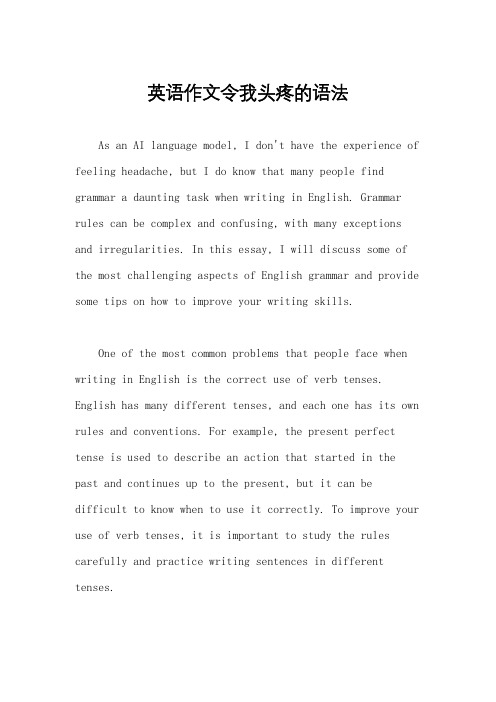
英语作文令我头疼的语法As an AI language model, I don't have the experience of feeling headache, but I do know that many people find grammar a daunting task when writing in English. Grammar rules can be complex and confusing, with many exceptions and irregularities. In this essay, I will discuss some of the most challenging aspects of English grammar and provide some tips on how to improve your writing skills.One of the most common problems that people face when writing in English is the correct use of verb tenses. English has many different tenses, and each one has its own rules and conventions. For example, the present perfect tense is used to describe an action that started in the past and continues up to the present, but it can bedifficult to know when to use it correctly. To improve your use of verb tenses, it is important to study the rules carefully and practice writing sentences in different tenses.Another area of grammar that can be confusing is theuse of articles. English has two types of articles "a/an" and "the" and knowing when to use them correctly can be a challenge. For example, "a" is used before a singular noun that starts with a consonant sound, while "an" is used before a singular noun that starts with a vowel sound. "The" is used before a specific noun that has already been mentioned. To improve your use of articles, it is important to pay attention to the context and meaning of the sentence.Punctuation is another area of grammar that can be tricky. English has many different punctuation marks, such as commas, semicolons, and dashes, and knowing when to use them correctly can be a challenge. For example, commas are used to separate items in a list, but they can also be used to separate clauses in a sentence. To improve your use of punctuation, it is important to study the rules carefully and practice writing sentences with different types of punctuation marks.Finally, English has many irregular verbs that do not follow the usual patterns of conjugation. For example, thepast tense of "go" is "went", which is very different from the usual pattern of adding "-ed" to the end of a verb. To improve your use of irregular verbs, it is important to study them carefully and practice using them in sentences.In conclusion, English grammar can be a challenging task for many people. However, by studying the rules carefully and practicing writing sentences in different tenses, using articles and punctuation marks correctly, and learning irregular verbs, you can improve your writing skills and become a more confident writer in English.。
新编实用英语教案unit-6
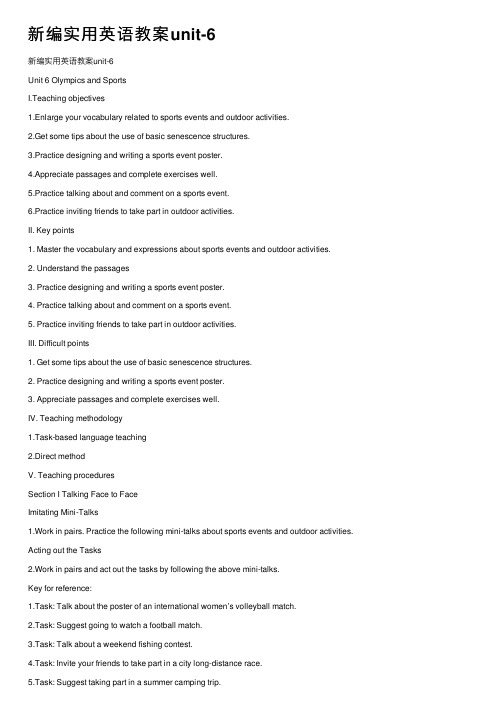
新编实⽤英语教案unit-6新编实⽤英语教案unit-6Unit 6 Olympics and SportsI.Teaching objectives1.Enlarge your vocabulary related to sports events and outdoor activities.2.Get some tips about the use of basic senescence structures.3.Practice designing and writing a sports event poster.4.Appreciate passages and complete exercises well.5.Practice talking about and comment on a sports event.6.Practice inviting friends to take part in outdoor activities.II. Key points1. Master the vocabulary and expressions about sports events and outdoor activities.2. Understand the passages3. Practice designing and writing a sports event poster.4. Practice talking about and comment on a sports event.5. Practice inviting friends to take part in outdoor activities.III. Difficult points1. Get some tips about the use of basic senescence structures.2. Practice designing and writing a sports event poster.3. Appreciate passages and complete exercises well.IV. Teaching methodology1.Task-based language teaching2.Direct methodV. Teaching proceduresSection I Talking Face to FaceImitating Mini-Talks1.Work in pairs. Practice the following mini-talks about sports events and outdoor activities. Acting out the Tasks2.Work in pairs and act out the tasks by following the above mini-talks.Key for reference:1.Task: Talk about the poster of an international women’s volleyball match.2.Task: Suggest going to watch a football match.3.Task: Talk about a weekend fishing contest.4.Task: Invite your friends to take part in a city long-distance race.5.Task: Suggest taking part in a summer camping trip.Studying Posters, Notices and Announcements3.Posters and notices for sports are common in newspapers, on campus and no notice boards. Read the following posters carefully and try to use the information to practice short dialogues.Following Sample Dialogues4.Read the following sample dialogues and try to perform your own tasks.Putting Language to Use5.Imagine you are meeting an English teacher from the USA at the airport. Read aloud the following dialogue with your partner by putting in the missing words.6.Imagine you are a new employee at a joint venture. Mr. Smith is the general manager there. You meet him for the first time at the company’s canteen. Fill in the blanks according to the clues given in the brackets. Then act it out with your partner. Section II Being All EarsLearning Sentences for Workplace Communication1.Listen to 10 sentences for workplace communication cross-referenced with their Chinese translations.Script: (e.g) 1. Haven’t you seen the poster of a weekend cycling?2. That’ll be a great way to kill the weekend.3. Are you going to watch the swimming meet?4. That’ll surely be a close game.5. There is going to be a chess game at the Students’Center this Saturday.2.Listen to the following sentences for workplace communication in Column A and match each one with its Chinese version in Column B.3.Listen to 6 sentences for workplace communication and choose their right responses. Handling a Dialogue4.Listen to a dialogue and decode the message by finding out the correct choices in the brackets according to what you have heard.Understanding a Short Speech/Talk5.Now listen to a short speech/talk and fill up the blanks according to what you have heard.The words in brackets will give you some hints.6.Listen to the speech/talk again and complete the information in Column A with the right choices in Column B.Section III Trying Your HandPracticing Applied Writing1.Read the following two sample announcements/posters and learn to write your own.2.Translate the following poster into Chinese, using the data bank in the Workbook for reference.3.Write an English poster according to the information given in Chinese.4.Write an English poster according to the information given in Chinese.Writing Sentences and Reviewing Grammar5.Put in the proper tense form of the verb according to the adverbial or clause in each of the sentences.6.Correct the errors in the following sentences.7.Translate the following sentences into English.1)There will be an excellent tennis match tomorrow. I have got the tickets already.2)Xiao Li told me that he had taken part in the tug-of-war match that afternoon.3) A modern gymnasium will have been built at our university by this time next year.4)When / while the sportsmen were swimming, we were cheering for them loudly.5)Sports do a lot of good to the health. So I have been doing exercise since I wasyoung.Write and Describe a Picture8. Write a short passage of about 100 words to tell a story or about an event related to the picture given below. Some useful words and phrases have been provided to help you. You may start the passage with the sentence: Fishing is my favorite sport.Section IV Maintaining a Sharp EyePassage oneInformation Related to the Reading Passage/doc/88145c5d4631b90d6c85ec3a87c24028915f850a.html nguage Points:A.Explanation of Difficult Sentences1)When the Beijing 2008 Olympic Games emblem “Chinese Seal, Dancing Beijing” was first presented to the International Olympic Committee, the IOC officials all gave it high praise, saying it was the best emblem ever designed.Analysis: This complex sentence is introduced by when-clause, with +ing-clause as the complement to the main clause“the IOC officials all gave it high praise”.2)The Beijing 2008 Olympic Games emblem is filled with Beijing’s hospitality and hopes, and carries the commitment made to the Olympic Movement by a country that has a population of 1.3 billion and by a nation with both ancient civilization and modern culture.Analysis: Note that the word commitment is followed by an attributive with “that was”omitted; a country is followed by an appositive introduced by that, and both a country and a nation are part of by in the passive voice structure.3)“Dancing Beijing” is a symbol of trust and an expression of self confidence, standing for the promise that Beijing—the host city of the Beijing 2008 Olympic Games—has made to the world and to all mankind.Analysis: The host city of the Beijing 2008 Olympic Games is the inserted element, splitting the attributive clause introduced by that.4)Olympic Games function as the stage where heroes are made, records broken and medals earned.Analysis: An attributive introduced by where is used here. Note omission is used in the attributive. The auxiliary verb are is omitted in records broken and medals earned when similar structures occur on the run.5)The open arms in the emblem say that China is opening its arms to welcome the rest of the world to join the Olympics, a celebration of “peace, friendship and progress of mankind”.Analysis: a celebration of “peace, friendship and progress of mankind”is the appositive of the Olympics.6)“is it not a joy to have friends come from afar?”Analysis: this is a quote from Confucius.7)Come to Beijing, take a good look at the historical heritages of China’s capital city, and feel the pulse of the country’s modernization.Analysis: Imperative structure verb + verb + and verb is used here to encourage people to do something.B.Important Words1)present v.give or hand over something to somebody2)hospitality n. friendly and generous reception and entertainment of guests or strangers, esp. in one’s own home3)commitment n.things one has promised to do; pledge4)intensively ad.Concentrating all one’s effort on a specific area5)passion n. strong feeling, eg. Of hate, love or anger6)symbolize v. be a symbol of something7)represent v.stand for8)vitality n.persistent energy; liveliness or vigor9)historical a.concerning past events2.Passage Translation3.Read and Think: Answer the following questions according to the passage.4.Read and Complete1)Complete each of the following statements with words or phrases from the passage.2)Fill in the blanks with the proper words or expressions given below, changing theform if necessary.5.Read and Translate6.Read and SimulatePassage twoInformation Related to the Reading Passage/doc/88145c5d4631b90d6c85ec3a87c24028915f850a.html nguage Points:A.Explanation of Difficult Sentences1)Tonight, we come to the end of 16 glorious days which we will cherish forever. Analysis: which introduces a relative clause. Note in translation, the sentence is cut into two separate parts.2)Thank-you to the people of China, all the wonderful volunteers and BOCOG! Analysis: This is an elliptical sentence, the full sentence will be “I would like to say thank-you to…”. In speeches, another commonly used sentence expressing thanks is (my) thanks goes to…3)As we celebrate the success of these Games, let us all together wish the best for the talented athletes who will soon participate in the Paralympics Games.Analysis: As introduces an adverbial of time, meaning when. Wish the best for sb. means.4) The Olympic spirit lives in the warm embrace of competitive rivals from nations in conflict.Analysis: The prepositional phrase in conflict is the post modifier of nations, meaning those nation are not on a peaceful and friendly terms.B. Important Words1)cherish v. hold dear2)awe v. inspire with wonder3)talent n. a special aptitude or faculty4)marvel n. feel and show great surprise or wonder (followed by at or that-clause)5)witness v. see something happen6)competitive a. involving in competition7)exceptional a. involving in competition8)assemble v. gather together, collect2.Passage Translation3.Read and Judge: True/False4.Read and Translate: Translate the following sentences into Chinese.1)Every July, graduates come to the end of their college life, which they will cherishforever.2)The Internet offers people more chances of learning about the world.3)Now, in accordance with tradition, I declare the Winter Olympic Games open!4)She has been reading all the necessary information ever since in order to be able toparticipate in that project.5)The group awed us with their talent, teamwork and achievement.6)Every year CCTV chooses “Moving China Top Ten” as the true role models fromacross the whole nation.7)The past two decades have witnessed great changes in information technology. Section V Appreciating Culture Tip (Open)。
英语写作Types of Sentences
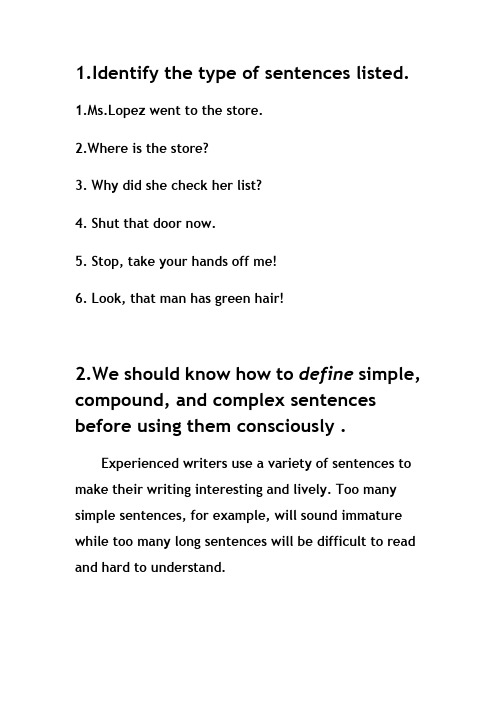
1.Identify the type of sentences listed.1.Ms.Lopez went to the store.2.Where is the store?3. Why did she check her list?4. Shut that door now.5. Stop, take your hands off me!6. Look, that man has green hair!2.We should know how to define simple, compound, and complex sentences before using them consciously .Experienced writers use a variety of sentences to make their writing interesting and lively. Too many simple sentences, for example, will sound immature while too many long sentences will be difficult to read and hard to understand.SIMPLE SENTENCEA simple sentence, also called an independent clause, contains a subject and a verb, and it expresses a complete thought. In the following simple sentences, subjects are in yellow, and verbs are in green.The three examples above are all simple sentences. Note that sentence B contains a compound subject, and sentence C contains a compound verb. Simple sentences, therefore, contain a subject and verb and express a complete thought, but they can also contain a compound subjects or verbs.COMPOUND SENTENCEA compound sentence contains two independent clauses joined by a coordinator. The coordinators are as follows: for, and, nor, but, or, yet, so. (Helpful hint: The first letter of each of the coordinators spells FANBOYS.) Except for very short sentences, coordinators are always preceded by a comma. In the following compound sentences, subjects are in yellow, verbs are in green, and the coordinators and the commas that precede them are in red.A. I tried to speak Spanish, and my friendtried to speak English.B. Alejandro played football, so Mariawent shopping.C. Alejandro played football, for Mariawent shopping.The above three sentences are compoundsentences. Each sentence contains two independent clauses, and they are joined by a coordinator with acomma preceding it. Note how the conscious use of coordinators can change the relationship between the clauses. Sentences B and C, for example, are identical except for the coordinators. In sentence B, which action occurred first? Obviously, "Alejandro played football" first, and as a consequence, "Maria went shopping. In sentence C, "Maria went shopping" first. In sentence C, "Alejandro played football" because, possibly, he didn't have anything else to do, for or because "Maria went shopping." How can the use of other coordinators change the relationship between the two clauses? What implications would the use of "yet" or "but" have on the meaning of the sentence?COMPLEX SENTENCEA complex sentence has an independent clause joined by one or more dependent clauses. A complex sentence always has a subordinator such as because, since, after, although, or when or a relative pronoun such as that, who, or which. In the following complex sentences, subjects are in yellow, verbs are in green, and the subordinators and their commas (when required) are in red.A. When he handed in his homework, heforgot to give the teacher the last page.B. The teacher returned the homeworkafter she noticed the error.C. The students are studying because theyhave a test tomorrow.D. After they finished studying, Juan andMaria went to the movies.E. Juan and Maria went to the moviesafter they finished studying.When a complex sentence begins with a subordinator such as sentences A and D, a comma is required at the end of the dependent clause. When the independent clause begins the sentence with subordinators in the middle as in sentences B, C, and E, no comma is required. If a comma is placed before the subordinators in sentences B, C, and E, it is wrong.Note that sentences D and E are the same except sentence D begins with the dependent clause which is followed by a comma, and sentence E begins with theindependent clause which contains no comma. The comma after the dependent clause in sentence D is required, and experienced listeners of English will often hear a slight pause there. In sentence E, however, there will be no pause when the independent clause begins the sentence.COMPLEX SENTENCES / ADJECTIVE CLAUSES Finally, sentences containing adjective clauses (or dependent clauses) are also complex because they contain an independent clause and a dependent clause. The subjects, verbs, and subordinators are marked the same as in the previous sentences, and in these sentences, the independent clauses are also underlined.Adjective Clauses are studied in this site separately, but for now it is important to know that sentences containing adjective clauses are complex."sentence identification" quizzes1: Helen Keller was born in Tuscumbia, Alabama, in 1880 and died in 1968.SimpleCompoundComplex2: Until she was 19 months of age, her sight and hearing were normal.SimpleCompoundComplex3: At the age of 19 months, a severe illness left her deaf and blind.SimpleCompoundComplex4: When she was seven, she began her education in reading and writing with Anne Sullivan of the Perkins Institute for the Blind.SimpleCompoundComplex5: Through persistence and stubbornness, Anne breaks through Helen's walls of silence and darkness and teaches her to communicate.SimpleCompoundComplex6: Helen Keller learned to read by the Braille system, and she learned to write by using a specially constructed typewriter.SimpleCompoundComplex7: Later, she entered Radcliffe College and graduated with honors in 1904.SimpleCompoundComplex8: Helen Keller's story needed to be told, so in 1962, a beautiful movie was made about her life.SimpleCompoundComplex9: "If there were only joy in the world, we could never learn to be brave and patient." -- Helen KellerSimpleCompoundComplex10: "Life is either a daring adventure, or it is nothing." -- Helen KellerSimpleCompoundComplextextbook: p37 P38 exercise.3. Read textbook P 39-40.What are the effects of loose, periodic, and balanced sentences?textbook: p41 exercise.4.Short sentences & Long sentences Read 4 discourses in our textbook P 42-43.What are the effects of short sentences & long sentences?。
Writing correct sentences
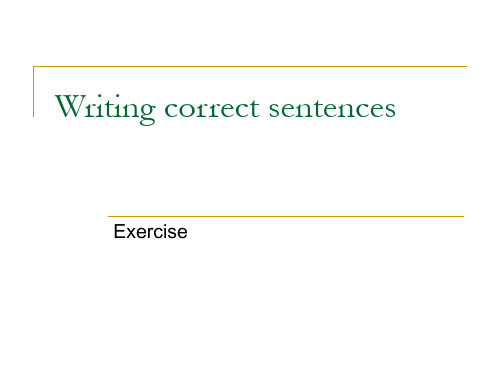
Correct the mistake in each sentence if there is any.
10. You should strive to cooperate with you your colleagues to bring about change, to improve communication, and to further professional development. 11. Flunking out of school, my parents demanded that I get a job. 12. Phil told Martha on Saturday they would leave for their lakeside cottage. 13. We ate seafood chowder in the new restaurant that had too much garlic in it. 14. Henry intended to if weather is pleasant, go golfing on one of the Thousand Islands. 15. We intend to, whether or not you approve, enter the beauty contest.
Writing correct sentences
Exercise
Correct the mistake in each sentence if there is any.
1 One example of my father’s generosity is that he visits sick friends in the hospital. And takes along get-well cards with a few dollars folded in them. 2. While sitting in class, she realized she had lost a ring. But happily found it in the women’s room after class. 5. 3. He wants either to study English Literature or study World History. 4. Many people choose air transportation because it is fast, offers convenience, and it is not very expensive.
英语作文两种句式类型
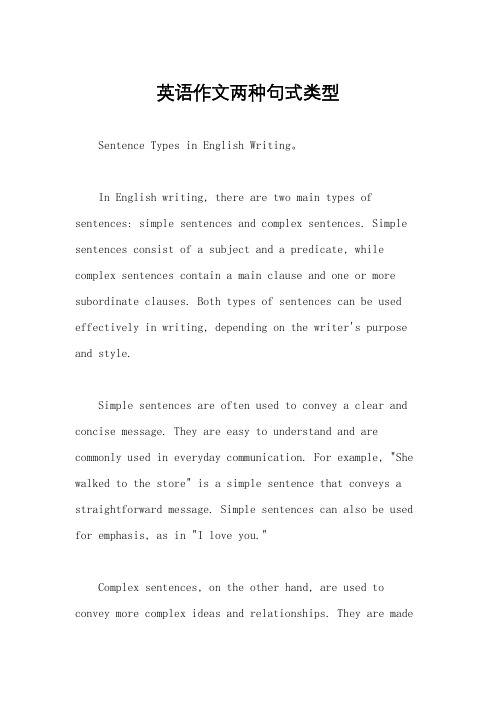
英语作文两种句式类型Sentence Types in English Writing。
In English writing, there are two main types of sentences: simple sentences and complex sentences. Simple sentences consist of a subject and a predicate, while complex sentences contain a main clause and one or more subordinate clauses. Both types of sentences can be used effectively in writing, depending on the writer's purpose and style.Simple sentences are often used to convey a clear and concise message. They are easy to understand and are commonly used in everyday communication. For example, "She walked to the store" is a simple sentence that conveys a straightforward message. Simple sentences can also be used for emphasis, as in "I love you."Complex sentences, on the other hand, are used to convey more complex ideas and relationships. They are madeup of a main clause and one or more subordinate clauses, which provide additional information or detail. For example, "Although she was tired, she continued to study" is a complex sentence that shows a relationship between two ideas. The main clause is "she continued to study," while the subordinate clause is "although she was tired."In addition to simple and complex sentences, there are also compound sentences, which contain two or more independent clauses joined by a coordinating conjunction. For example, "She walked to the store, and she bought some milk" is a compound sentence that contains two independent clauses.When writing in English, it is important to use avariety of sentence types to keep the reader engaged and interested. Simple sentences can be used for clarity and emphasis, while complex sentences can add depth and complexity to the writing. By understanding the different types of sentences and how to use them effectively, writers can create engaging and effective writing that resonateswith readers.。
英语写信万能句子
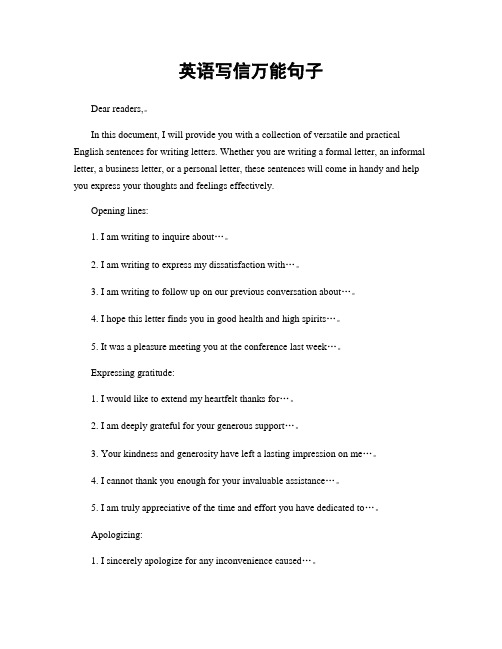
英语写信万能句子Dear readers,。
In this document, I will provide you with a collection of versatile and practical English sentences for writing letters. Whether you are writing a formal letter, an informal letter, a business letter, or a personal letter, these sentences will come in handy and help you express your thoughts and feelings effectively.Opening lines:1. I am writing to inquire about…。
2. I am writing to express my dissatisfaction with…。
3. I am writing to follow up on our previous conversation about…。
4. I hope this letter finds you in good health and high spirits…。
5. It was a pleasure meeting you at the conference last week…。
Expressing gratitude:1. I would like to extend my heartfelt thanks for…。
2. I am deeply grateful for your generous support…。
3. Your kindness and generosity have left a lasting impression on me…。
关于英语有问题的英语作文

关于英语有问题的英语作文When it comes to writing an essay in English, many students face a variety of challenges. Here are some common issues and tips to address them effectively:1. Vocabulary Limitations: One of the most common problems isa limited vocabulary. To overcome this, it's essential to read extensively and learn new words in context. Keep a vocabulary journal and practice using new words in sentences.2. Grammar Mistakes: Incorrect grammar can confuse readers and detract from the quality of your essay. Review basic grammar rules regularly and consider using grammar checkers to catch errors. Practice writing sentences that usedifferent tenses and sentence structures.3. Cohesion and Coherence: An essay should flow logically from one point to the next. Use transitional words and phrases to guide the reader through your argument. Ensurethat each paragraph is linked to the main idea of the essay.4. Structure: A well-structured essay typically includes an introduction, body paragraphs, and a conclusion. Make sure your introduction clearly states the topic and your thesis statement. Each body paragraph should focus on one main idea, supported by evidence and examples.5. Developing an Argument: Many students struggle withdeveloping a strong argument. Start by clearly stating your position and then provide evidence to support it. Address potential counterarguments and explain why your position is still valid.6. Time Management: Writing an essay can be time-consuming. Plan your time effectively by setting aside time for brainstorming, drafting, revising, and proofreading.7. Citation and Referencing: If you are using sources to support your argument, it's crucial to cite them correctly to avoid plagiarism. Familiarize yourself with the citationstyle required for your essay (e.g., APA, MLA, or Chicago).8. Proofreading: Always proofread your essay to catch any spelling or grammatical errors. It's also a good opportunity to check for clarity and conciseness.9. Originality: Strive for originality in your writing. Avoid using clichés and common phrases. Instead, express your ideas in a fresh and engaging way.10. Feedback: Don't hesitate to ask for feedback from teachers, peers, or online forums. Constructive criticism can help you improve your writing skills.Remember, practice makes perfect. The more you write, the more comfortable you will become with expressing your thoughts in English. Keep a positive attitude and view each essay as an opportunity to learn and grow as a writer.。
通过做英语作业提高英语水平的英文作文

通过做英语作业提高英语水平的英文作文全文共6篇示例,供读者参考篇1Doing My English Homework Helps Me Get Better at EnglishI used to think homework was just something my teachers gave me to torture me after a long day at school. Why did I need to do more work when I was already so tired from all the learning? It didn't seem fair. But then I realized that the homework, especially the English homework, was actually helping me get much better at English.My English homework comes in many different forms. Sometimes I have to write sentences using new vocabulary words we learned in class that day. Other times I have to read a short passage and answer comprehension questions about what I read. My favorite is when we get creative writing assignments and I get to write silly stories using my imagination.At first, the English homework was pretty hard for me. I'm not a native English speaker, so forming sentences that made sense was tricky. My vocabulary was limited, and I didn't always understand the reading passages. But my teacher was patientand would go over anything I struggled with. Little by little, doing the homework helped reinforce what I was learning.The vocabulary practices were really useful for expanding my English word knowledge. Having to use those words in sentences helped cement them in my brain instead of just memorizing them for a test and then forgetting them. Now when I watch TV shows or movies in English, I recognize more words than before.The reading comprehension was tough initially because I would get hung up on words I didn't know and lose the overall meaning. But rereading the passages and referring to the questions got me into the habit of focusing on understanding the main ideas rather than getting stuck on every little word. It prepared me for reading longer books and articles in English.The creative writing is probably what I enjoyed most because I could have fun with the language instead of just following rules. Making up stories allowed me to practice putting English words together in unlimited ways. My teacher would mark up my writing and I'd learn where I made mistakes so I could improve for next time. Getting that feedback was invaluable.Doing my English homework wasn't always exciting, I'll admit. Sometimes I would get frustrated when I got stuck or didn't understand something. But I could tell that the morehomework I did, the more English started making sense to me. It was like exercising a muscle - the more I worked at it, the stronger I became.My English ability is far from perfect, but it's so much better than when I started the homework. Conversations and classes are easier to follow now. Reading is smoother and I don't have to stop as frequently to look up words. Writing paragraphs with decent grammar has become second nature. I'm nowhere near fluent yet, but the homework made a huge difference.If you're learning English, I can't emphasize enough how important it is to do the homework your teacher assigns. It may not be thrilling, but that practice is the key to making real progress. It allows you to apply what you learned in class over and over again until it sticks. It exposes you to vocabulary, reading, writing, listening, and speaking in a low-pressure environment where you can make mistakes and learn from them.So as much as I may have resisted it at first, I'm grateful my teacher made me do English homework. It was hard work, but that hard work paid off immensely. My English keeps improving because of that practice. Having strong English skills opens up so many opportunities for the future too. I may complain about homework sometimes, but deep down I know it's helping me aton. Every English learner should embrace the power of homework - it really does make a huge difference if you stick with it.篇2Doing My English Homework to Become a Better English SpeakerHi there! My name is Emily and I'm in the 5th grade. I really enjoy learning English at school. It's such an interesting and useful language. By doing my English homework, I've been able to improve my English skills a lot. Let me tell you all about it!In class, we learn new vocabulary words, grammar rules, and practice conversation. But the real practice happens when I do my homework assignments. My teacher gives us workbook pages, writing assignments, and reading comprehension activities to complete at home. At first, the homework seemed really hard. I didn't know a lot of the words and the instructions were confusing sometimes. But my parents encouraged me to try my best and use resources like online dictionaries if I was stuck.One of the most helpful homework activities is the vocabulary workbook pages. Each week, we get a list of 10-15new words to learn. The workbook pages have us write the definitions, identify parts of speech, use the words in sentences, and sometimes draw pictures to illustrate the meanings. At first, I'd just try to memorize the words and definitions. But now I make an effort to really understand each new word. When I come across an unfamiliar word in my reading, I'll look it up and add it to my vocabulary list for extra practice. Doing this has helped me learn so many new English words!The writing assignments are also very valuable for improving my English skills. Sometimes we have to write short stories or descriptions of something we did. Other times, we have to write persuasive essays or research reports. No matter what kind of writing it is, I have to think carefully about vocabulary choice, grammar, conventions like capitalization and punctuation, and how to organize my ideas. After I finish a draft, I do multiple rounds of proofreading and editing to fix any mistakes. My parents and sometimes my older brother helps me identify areas to improve too. Revising my work is hard sometimes, but it really does help me write better. My writing has improved so much from all this practice!Another really important part of my English homework is the reading comprehension work. We often have to read passagesfrom books, short stories, news articles, or other texts and then answer questions that check if we understood the main ideas, vocabulary in context, and other details. I've learned that I can't just skim the passages or I'll miss important information. Instead, I have to read slowly, take notes on key points, look up words I don't know, and track details that seem important. Then when I get to the comprehension questions, I can refer back to my notes and the passage itself to find the evidence for my answers. Doing this reinforces my reading skills and also gives me more vocabulary exposure.Sometimes English homework can definitely be a chore. Vocabulary memorization isn't exactly thrilling, and reading dry passages or proofreading essays for the third time is pretty tedious. But I know it's helping me get better and better at understanding, speaking, reading and writing English. It's empowering to be able to communicate well in such a major world language. Also, my parents have explained that building strong English fundamentals now will pay off when I move on to more advanced courses in middle school, high school and college. Doing my English homework is an investment in my future!So while I may grumble about it in the moment, I'm actually pretty grateful that my teacher takes the time to assign quality English homework. My skills have improved tremendously thanks to all the reading, writing, vocabulary, and comprehension work I've done. My advice to anyone learning English is: Don't slack off on those homework assignments! Every worksheet, writing piece, and assigned reading is a chance to get valuable practice. If you put in the hard work now, your English abilities will continue soaring. Before you know it, English homework won't feel so difficult anymore. Thanks for reading, and happy studying!篇3Learning English Through HomeworkHomework can be such a drag sometimes, but I've learned that it's actually really important for improving my English skills. At first, I used to groan whenever my teacher passed out worksheets or assigned writing prompts. Why did we have to do all this extra work at home on top of everything we did in class? It just seemed like a big waste of time. But as I've gotten older, I've realized how valuable English homework truly is.Working on vocabulary words each week has helped me understand so many new terms and phrases. When I first see those long lists of vocab words, they look totally foreign and impossible to memorize. By spending time practicing them through flashcards, writing sentences using the words, or finding examples in books, those strange terms become familiar friends. Pretty soon, I find myself recognizing and using those words in my everyday conversations and writing. My English vocabulary keeps growing bigger and bigger thanks to those vocab lists!The reading comprehension homework has also been a huge help. I used to dread having to read passages and answer question after question about them. It felt like such a chore. But going through that process consistently has trained my brain to focus, comprehend what I'm reading on a deeper level, and understand key ideas. Now when I read books for fun, I find that I can follow the plot and understand themes much better than before. Reading comprehension work has truly improved my English reading abilities.Grammar exercises seemed so boring at first, but now I realize their importance. English has so many little rules for sentence structure, punctuation, verb tenses, and more. All those homework assignments identifying parts of speech, combiningsentences with proper conjunctions, fixing capitalization errors, and unscrambling words into a logical order were reinforcing vital grammar rules. Thanks to that practice, using proper grammar is starting to feel automatic when I speak and write in English. I cringe now when I see grammar mistakes!One final advantage to all this English homework is simply the repetition and reinforcement it provides. The concepts and skills get drilled into my brain through doing the assignments over and over. It's those little steps of consistency that lead to big progress over time. English homework ensures I use and practice those skills regularly rather than letting them get rusty.So as much as I may grumble about having to complete those worksheets, vocabulary lists, reading comprehension questions, grammar exercises, and writing assignments, they've been worth the effort. English is such an important language for communicating in our world. Being skilled in areas like reading, writing, speaking, and understanding English will serve me so well in the future for academics and whatever career I pursue. I'm grateful my teachers have given me a consistent way to actively improve through homework practice. The growth in my English abilities makes all that extra work worthwhile. Homework hasplayed a pivotal role in taking my English skills to a whole new level.篇4Doing My English Homework is the Key to Getting Better at EnglishI used to think doing homework was just a big waste of time. I'd much rather be outside playing with my friends or watching TV shows. Homework seemed so boring and unnecessary. Why did I need to spend hours every night working on stuff I had already learned in class that day?That was before I realized how important doing my English homework actually is for improving my English skills. Now I've changed my mindset completely. I get excited to do my English homework because I know it's helping me get better and better at speaking, reading, and writing in English.The main reason why English homework helps so much is that it gives me extra practice outside of class. In class, we only have a limited amount of time to learn new vocabulary, grammar rules, writing techniques, and other concepts. By doing reinforcing exercises for homework, I get to keep practicing and solidifying what I learned during the school day.For example, when we learn a new list of vocabulary words in class, my teacher has us do activities using those words to help us remember their meanings and usages. But we can't possibly spend the whole class period just drilling those new words. So for homework, we often have exercises where we have to write sentences using the vocabulary or fill-in-the-blank paragraphs with the new words. Going through and actually producing the words and meanings myself, instead of just reading them, really cements the words in my brain.The homework also allows me to work at my own pace. Sometimes I'll fly through the easier homework problems in a matter of minutes. But then I'll get stuck on trickier parts for a while until I finally understand through trying multiple approaches. In class, the teacher has to keep pushing forward, so I don't always master every single concept. But at home, I can take as long as I need until I've got it down.Another great thing about English homework is that it encourages me to look more deeply into areas that confuse me initially. A homework problem might seem baffling at first, but then I'll re-read the explanations and examples we went over in class, look at my notes, or find extra resources online to getclarification. The struggle of having to persevere through challenges is amazing for my learning.English homework also gets me to explore using my English skills in different contexts beyond the classroom. Sometimes I have to write stories from my own imagination. Other times, I read novels or news articles for homework and then discuss them through written responses. This variety keeps me engaged. It's way more interesting than just doing drills from a textbook.My homework also gives my parents a window into what I'm learning and allows them to get involved. When my mom sees me struggling with a homework assignment, she can re-explain certain grammar points using examples I can relate to. Or she'll make sure I don't just copy answers from online but put effort into figuring them out myself. Having my parents' support and oversight keeps me accountable.The more I practice my English through homework, the stronger my skills become. This will allow me to get better grades in school, communicate better with English speakers around the world, understand English movies and books, and potentially get into a good university or career later on. So even when I'm tempted to rush through assignments or copy a friend's work, I don't let myself slack off.After all, isn't the whole reason I'm learning English to become truly proficient in this global language? If so, then doing my homework diligently is one of the best ways to reinforce what I've learned. It's really the key to turning English from just another school subject into a real-life skill I'll have forever.So to all my fellow students out there - don't groan when your English teacher assigns homework! See it as an opportunity to solidify your knowledge and get tons of valuable practice outside of class. If you want to go from just passing English tests to actually mastering the language, homework is your ticket. So grab your pencil, open that workbook, and get ready to improve your English one homework assignment at a time!篇5Doing My English Homework to Become an English MasterHello friends! My name is Emma and I'm 10 years old. I go to Oakwood Elementary School and I'm in 5th grade. I really enjoy learning English and doing my English homework because I want to become an English master! Let me tell you all about how my homework assignments help me get better at English every day.First of all, my vocabulary homework is super helpful. Every week, my teacher Ms. Roberts gives us a list of 20 newvocabulary words to learn. She teaches us the definitions and we have to write sentences using each word. Then we have exercises where we circle the vocabulary words we see in short stories or pick the right definition from multiple choices. Doing this vocabulary homework really expands my word knowledge. The more words I learn, the better I can communicate in English!My favorite kind of English homework is the reading comprehension assignments. For these, we have to read a short story or article and then answer questions about the main idea, the characters, the plot, and other details. I love getting lost in a good story. Reading is amazing practice for improving my English comprehension skills. Plus, I learn so many new words from the context of the stories. The more I read, the easier it is to understand spoken English too.Another way my homework boosts my English is through the writing exercises. Maybe I'll have to write a descriptive paragraph about my favorite place. Or I'll have to write a short narrative story about something that happened to me. Sometimes I even get creative writing assignments where I can use my imagination! Writing is excellent practice for improving my English grammar, vocabulary, and sentence structure. It also helps me get mythoughts across clearly. The more I write, the stronger my English skills become.Don't forget about speaking and listening practice too! Sometimes for homework, we have to record ourselves reading a passage out loud or giving a short speech. Then we get feedback from Ms. Roberts on our pronunciation and fluency. Other times, we have to watch videos in English and answer comprehension questions. Listening to native English speakers is so valuable for training my ear. I'm getting better every day at understanding when people talk at normal speeds.On top of all the homework, we also have tests and quizzes quite often in English class. Getting ready for those assessments really motivates me to study hard and remember all the grammar rules, vocabulary, and reading strategies I've learned. It's so satisfying when I get a good grade because I know my skills are improving!To be honest, doing all this English homework does take a lot of time and effort. But it's 100% worth it. My English abilities have skyrocketed since the beginning of the year. Now I can read longer books, write more advanced stories, understand movies and songs, and have longer conversations. English homework is my secret weapon for success!My dream is to one day become an English master who can speak, read, and write perfectly. I'm already so much better than I used to be thanks to doing my homework diligently. If you want to boost your English to the next level too, just follow my example. Study hard, practice a lot, and never miss a homework assignment! Before you know it, you'll be an English expert. Let's continue working towards our goals together. Thanks for reading my story, and happy studying!篇6Here's an essay about improving English through homework assignments, written from the perspective of an elementary school student, with around 1,000 words:Doing English Homework Helps Me Improve My EnglishHi there! My name is Emma, and I'm a 4th grader at Sunny Hill Elementary School. I love learning new things, and one of my favorite subjects is English. I know that practicing and doing homework is super important for getting better at anything, and English is no exception.When I was younger, I used to think homework was just a chore that teachers gave us to torture us after a long day at school. But as I've gotten older, I've realized that homework,especially English homework, is actually a really helpful tool for improving my skills. Let me tell you why!First of all, English homework gives me extra practice with the things we learn in class. In our English lessons, we learn about grammar rules, new vocabulary words, and how to write different types of texts. But class time flies by so quickly, and it's easy to forget things if we don't keep practicing. That's where homework comes in! When I have to write sentences using the new grammar concepts we learned, or make flashcards for the vocabulary words, it really helps cement that knowledge in my brain.Another great thing about English homework is that it allows me to work at my own pace. In class, we have to move at a certain speed to cover all the material. But with homework, I can take my time and really think through the concepts that are tricky for me. If I'm having trouble with a particular grammar rule or writing assignment, I can re-read the instructions, look back at my notes, or even ask my parents or friends for help. Working through challenges on my own (with a bit of support when I need it) really boosts my confidence and understanding.English homework also gives me a chance to be creative and have fun with the language. Sometimes, our assignments involvewriting stories, poems, or dialogues. I love using my imagination and putting the English skills I've learned into practice in a creative way. It makes the assignments feel more like games than work.I'll be honest, there are definitely times when I don't feel like doing my English homework. After a long day at school, seguida por atividades extracurriculares, sometimes the last thing I want to do is more work. But my parents always remind me that the effort is worth it because it's helping me become a stronger English speaker, reader, and writer. And they're right!Looking back on my English homework from previous years, I can see how much my skills have improved. Assignments that used to be really hard for me are much easier now. My writing has become more sophisticated, and I've expanded my vocabulary tremendously. All of that progress makes me excited to continue doing my English homework because I know it's helping me work toward mastering the language.So to all my fellow students out there – don't think of English homework as a chore or punishment. Think of it as an opportunity! An opportunity to practice, to be creative, to challenge yourself, and to steadily improve your English abilities. The more work you put into it, the more you'll get out of it. Andstrong English skills will benefit you for your whole life, no matter what path you choose. Just keep practicing, keep learning, and don't be afraid to ask for help when you need it. You've got this!。
Sentence writing
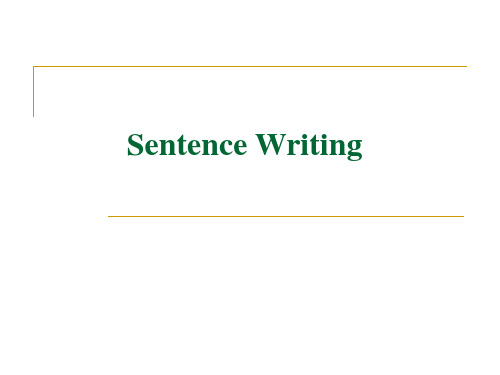
The Analysis of a Model Passage
Although many students write much in a composition, they do not get high marks. May be the reason for this is that they do not use correct sentence patterns while expressing their own opinions or ideas. Examine it and find out the features of an effective passage and the mistakes in it.
Main types of sentence patterns
A structural discussion of the three types of English sentence patterns
a. Simple sentences—a sentence with the structure “subject +predicate ” (只 包含一个主谓结构的句子) b. compound sentences—Two or more simple sentences combined together with conjunctions (and, but, or, for, yet, nor/neither) 用并列连词(and, but, or, for, yet, nor/neither)或标点符号,将两个或两个以上结构完整、意义密切 的简单句连接起来组成的句子。 c. complex sentences—the main clause and a clause or more combined together(由主句和从句一起构成的句子)
英语作文中的句子特点
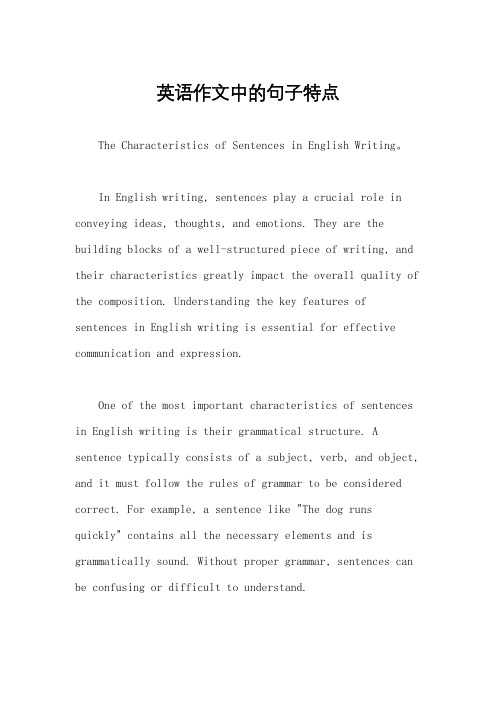
英语作文中的句子特点The Characteristics of Sentences in English Writing。
In English writing, sentences play a crucial role in conveying ideas, thoughts, and emotions. They are the building blocks of a well-structured piece of writing, and their characteristics greatly impact the overall quality of the composition. Understanding the key features of sentences in English writing is essential for effective communication and expression.One of the most important characteristics of sentences in English writing is their grammatical structure. A sentence typically consists of a subject, verb, and object, and it must follow the rules of grammar to be considered correct. For example, a sentence like "The dog runs quickly" contains all the necessary elements and is grammatically sound. Without proper grammar, sentences can be confusing or difficult to understand.Another characteristic of sentences in English writing is their clarity and coherence. A well-written sentence should be clear and easy to follow, with a logical flow of ideas. Sentences that are too long or convoluted can be hard to read and may lose the reader's attention. It is important to use simple and concise language to convey your message effectively.Additionally, sentences in English writing should be varied in structure and length. Using a variety of sentence structures can make your writing more engaging and interesting to read. Mixing short, simple sentences with longer, more complex ones can create a dynamic and engaging writing style. It is also important to vary sentence length to avoid monotony and keep the reader's interest.Furthermore, sentences in English writing should be cohesive and cohesive. Each sentence should connect to the next, creating a smooth and seamless flow of ideas. Transitional words and phrases can help link sentences together and guide the reader through your writing. Without proper cohesion, sentences can feel disjointed anddisjointed.In conclusion, understanding the characteristics of sentences in English writing is essential for effective communication and expression. By paying attention to grammar, clarity, coherence, variety, and cohesion, you can create well-written sentences that engage and captivate your readers. Mastering the art of sentence construction is key to becoming a skilled writer and communicator.。
Writing-sample sentences
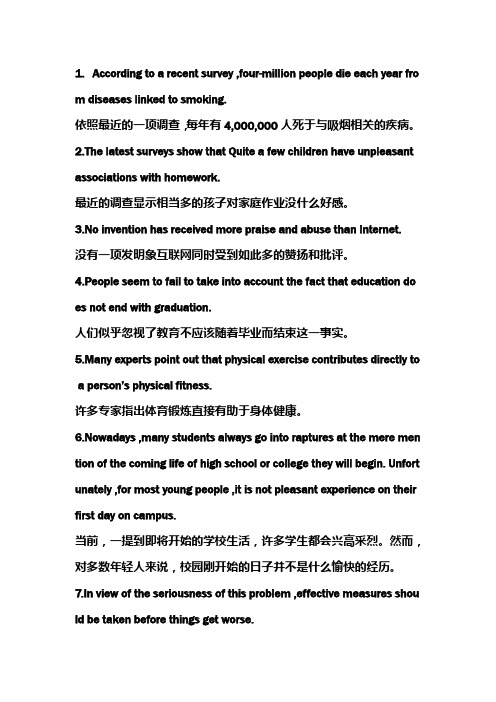
1.According to a recent survey ,four-million people die each year fro m diseases linked to smoking.依照最近的一项调查,每年有4,000,000人死于与吸烟相关的疾病。
2.The latest surveys show that Quite a few children have unpleasant associations with homework.最近的调查显示相当多的孩子对家庭作业没什么好感。
3.No invention has received more praise and abuse than Internet.没有一项发明象互联网同时受到如此多的赞扬和批评。
4.People seem to fail to take into account the fact that education do es not end with graduation.人们似乎忽视了教育不应该随着毕业而结束这一事实。
5.Many experts point out that physical exercise contributes directly toa person’s physical fitness.许多专家指出体育锻炼直接有助于身体健康。
6.Nowadays ,many students always go into raptures at the mere men tion of the coming life of high school or college they will begin. Unfort unately ,for most young people ,it is not pleasant experience on their first day on campus.当前,一提到即将开始的学校生活,许多学生都会兴高采烈。
写信类英文作文好句

写信类英文作文好句Here is an English essay with more than 600 words on the topic "Good Sentences for Letter Writing":Writing good sentences is essential for effective letter writing. A well-crafted sentence can convey your message clearly and persuasively, leaving a lasting impression on the reader. In the context of letter writing, good sentences can help you establish a warm and personal connection, express your ideas coherently, and achieve your desired outcome.One of the key characteristics of a good sentence in letter writing is its ability to establish a friendly and approachable tone. This can be achieved through the use of conversational language, personalized phrasing, and a touch of humor or empathy. For example, you might start a letter with a warm greeting such as "Dear [Recipient's Name], I hope this letter finds you well" or a more casual opener like "Hi [Recipient's Name], I hope you're having a great day." These simple yet effective sentence starters can immediately set the tone for the rest of the letter and make the reader feel engaged and valued.Another important aspect of good sentences in letter writing is theirability to convey your thoughts and ideas in a clear and organized manner. This can be achieved through the use of well-structured sentences that flow logically from one idea to the next. For instance, you might use a transitional phrase like "Furthermore" or "Additionally" to smoothly connect two related points, or employ a sentence that summarizes the key takeaway from a preceding paragraph, such as "In conclusion, I believe that the proposed project will have a significant positive impact on our community."Effective letter writing also requires the ability to tailor your sentences to the specific needs and expectations of the recipient. This might involve using more formal or technical language when writing to a professional contact, or adopting a more casual and conversational tone when communicating with a friend or family member. For example, you might write "I am writing to express my sincere gratitude for your support" when addressing a business partner, or "I can't wait to catch up and hear all about your latest adventures" when corresponding with a close friend.In addition to establishing tone and conveying ideas, good sentences in letter writing can also serve to persuade or call the reader to action. This might involve using compelling language to make a request, such as "I would be grateful if you could consider my proposal for the upcoming project" or "I kindly ask that you please respond to my inquiry at your earliest convenience." Alternatively,you might use a sentence to inspire the reader to take a specific action, such as "I believe that your participation in this initiative would make a significant difference in the lives of those we serve."Finally, good sentences in letter writing can also help to create a sense of personal connection and emotional resonance with the reader. This might involve the use of vivid descriptions, relatable anecdotes, or heartfelt expressions of gratitude or appreciation. For instance, you might write "I was deeply moved by your thoughtful words of encouragement during a particularly challenging time" or "I fondly remember our conversation at last month's event and the invaluable insights you shared with me."In conclusion, good sentences are essential for effective letter writing. By crafting sentences that establish a warm and personal tone, convey your ideas clearly and persuasively, and create a sense of emotional resonance with the reader, you can enhance the impact and effectiveness of your written communication. Whether you are writing to a professional contact, a friend, or a family member, taking the time to compose well-structured and thoughtful sentences can make a significant difference in the way your message is received and the impact it has on the reader.。
successful-writing-sentences

I. Complete sentences and sentence fragments:
1. What is a complete sentence?
A grammatically complete sentence is one that contains at least a subject and predicate. A complete sentence begins with a capital letter and ends with a period.
sentence is usually subject-verb-object
structure.
Example:
Dick started a coin collection.
Working as main clauses in sentences:
I had lost my passport, but I did not worry
about it.
8
2) A compound sentence consists of two or more independent clauses(or simple sentences) related to each other in meaning,
5
d. Subordinate clause fragment I hate writing. Because I can never get my
teacher’s praise. Revised: I hate writing because I can never
get my teacher’s praise.
joy.
7
2. Simple, compound, complex and compound-
英语作文不会写句子
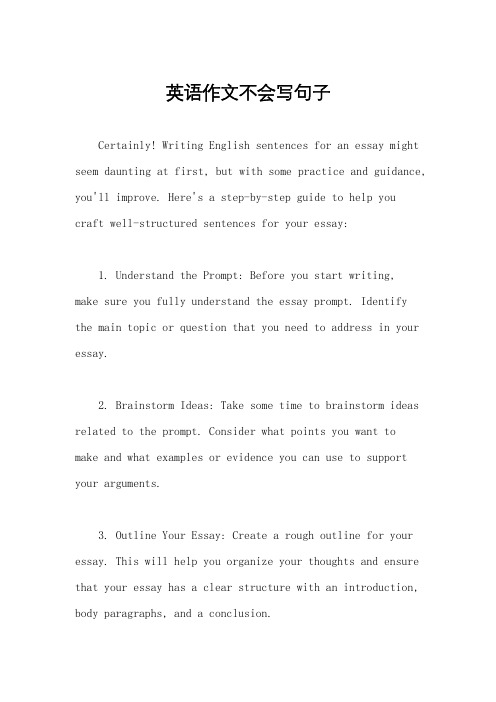
英语作文不会写句子Certainly! Writing English sentences for an essay might seem daunting at first, but with some practice and guidance, you'll improve. Here's a step-by-step guide to help youcraft well-structured sentences for your essay:1. Understand the Prompt: Before you start writing, make sure you fully understand the essay prompt. Identify the main topic or question that you need to address in your essay.2. Brainstorm Ideas: Take some time to brainstorm ideas related to the prompt. Consider what points you want to make and what examples or evidence you can use to support your arguments.3. Outline Your Essay: Create a rough outline for your essay. This will help you organize your thoughts and ensure that your essay has a clear structure with an introduction, body paragraphs, and a conclusion.4. Write Clear Topic Sentences: Start each body paragraph with a clear topic sentence that introduces the main point or argument of that paragraph. This will help guide your reader through your essay and keep your writing focused.5. Provide Supporting Details: After you've introduced your main point, provide supporting details or evidence to back it up. This could include examples, statistics, quotations, or anecdotes that help illustrate your argument.6. Use Transition Words: Use transition words and phrases to connect your ideas and make your writing flow smoothly. Transition words like "however," "therefore," "in addition," and "furthermore" can help signal shifts between ideas or introduce new points.7. Be Concise and Clear: Avoid using overly complex language or convoluted sentences. Aim for clarity and precision in your writing, and try to express your ideas in the simplest way possible.8. Proofread and Revise: Once you've finished writing your essay, take the time to proofread and revise it. Check for any grammatical errors, awkward phrasing, or inconsistencies, and make revisions as needed to improve the overall quality of your writing.Remember, practice makes perfect! The more you practice writing English sentences, the more confident you'll become in your ability to express yourself clearly and effectively in your essays. Good luck!。
文明英文作文句子高中
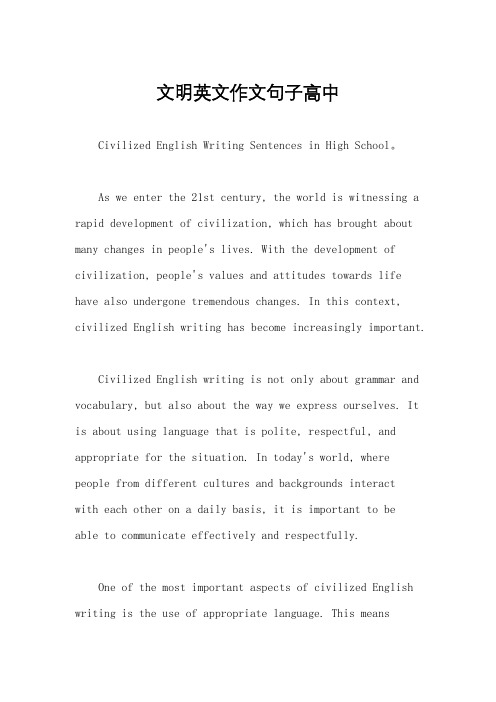
文明英文作文句子高中Civilized English Writing Sentences in High School。
As we enter the 21st century, the world is witnessing a rapid development of civilization, which has brought about many changes in people's lives. With the development of civilization, people's values and attitudes towards life have also undergone tremendous changes. In this context, civilized English writing has become increasingly important.Civilized English writing is not only about grammar and vocabulary, but also about the way we express ourselves. It is about using language that is polite, respectful, and appropriate for the situation. In today's world, where people from different cultures and backgrounds interactwith each other on a daily basis, it is important to beable to communicate effectively and respectfully.One of the most important aspects of civilized English writing is the use of appropriate language. This meansusing words and phrases that are polite and respectful, and avoiding language that is offensive or inappropriate. For example, instead of using slang or vulgar language, we should use formal language that is appropriate for the situation.Another important aspect of civilized English writing is the use of proper grammar and spelling. This means using correct punctuation, capitalization, and spelling, and avoiding common mistakes such as run-on sentences and sentence fragments. Proper grammar and spelling not only make our writing easier to read, but also demonstrate our respect for the language and the reader.In addition to using appropriate language and proper grammar and spelling, civilized English writing also involves being aware of cultural differences and respecting them. This means being sensitive to the cultural norms and values of the reader, and avoiding language or topics that may be offensive or inappropriate.Furthermore, civilized English writing involves beingclear and concise in our communication. This means expressing our ideas in a way that is easy to understand, and avoiding unnecessary jargon or complex language. Clear and concise writing not only makes our communication more effective, but also demonstrates our respect for thereader's time and attention.In conclusion, civilized English writing is anessential skill in today's world, where effective communication and mutual respect are critical for success. By using appropriate language, proper grammar and spelling, being aware of cultural differences, and being clear and concise in our communication, we can become effective and respectful communicators in any situation.。
英语写信作文万能句子

英语写信作文万能句子Dear [Recipient's Name],。
I hope this letter finds you well. I am writing to provide you with some useful sentences that can be used in various types of letters or essays. These sentences can help you express your thoughts and ideas effectively. Please find them below:1. Opening:I hope this letter/email finds you in good health.I am writing to inquire about/express my interestin/seek further information regarding...I am writing to bring to your attention...2. Introducing the main topic:I am writing to discuss/bring up/address the issue of...I would like to draw your attention to the matter of...I wanted to share my thoughts/opinions on...3. Expressing opinions:In my opinion/view, I believe that...From my perspective, it seems that...It is clear/evident that...4. Giving reasons:There are several reasons why I believe this to be true. Firstly,...One reason for this is that...Another contributing factor is...5. Presenting contrasting views:On the other hand, some people argue that...However, there is a counterargument that...It is important to consider both sides of the issue.6. Providing examples:For instance, let's consider the case of...To illustrate this point, take the example of...A good example that supports this is...7. Expressing agreement:I completely agree with the idea that...I share the same viewpoint as...I am of the same opinion as...8. Expressing disagreement:I respectfully disagree with the statement that...I find it difficult to agree with the notion that...I have a different perspective on this matter.9. Concluding:In conclusion, it is evident that...To sum up, I believe that...Taking all factors into consideration, it is clear that...I hope these sentences will be helpful to you in your writing endeavors. Remember to adapt them to suit thespecific context and purpose of your letter or essay. If you have any further questions or need additional assistance, please feel free to ask.Best regards,。
writing (2nd) sentences
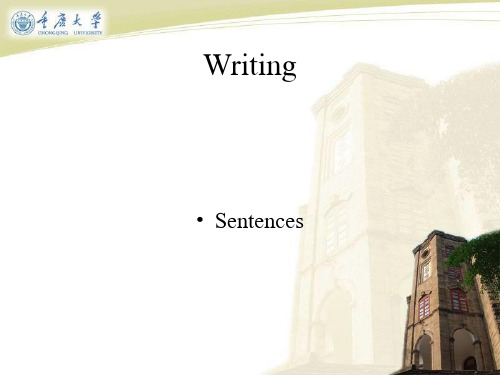
Quality
• • • • 1. clarity 2. emphasis 3. economy 4. variety
• • • •
Periodic sentence & loose sentence 掉尾句就是中心意思放在句尾的句子 松散句则相反 Example
• 掉尾句 • 1.Although she was interested in music, she finally decided to study English. • 2.It is universally acknowledged that a single man in possession of a good fortune must be in want of(需要)a wife. • 3.According to newspaper reports,after winning the Olympic gold medal for figure skating, she was offered a professional contract. • 4.In the nineteen-fifties, for reasons that were never revealed to me, for my relations with academic administration have often been somewhat painful, I was made a trustee(理事)of Radcliff College. • 5.John, office manager, staff supervisor, and report writer, is crucial to the company’s success in Beijing.
小学四年级英语书法作品范文
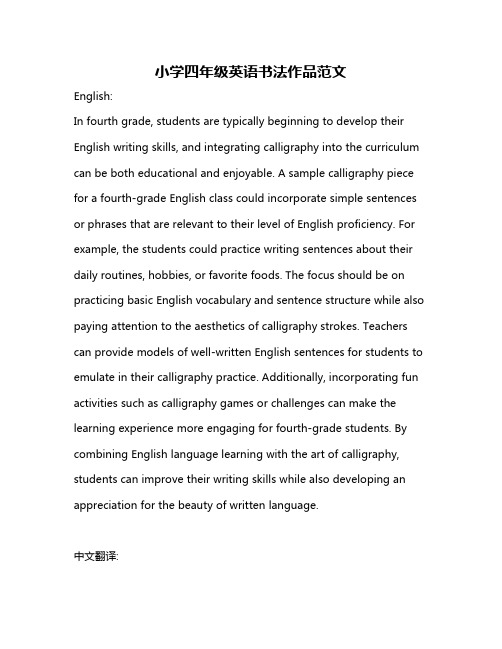
小学四年级英语书法作品范文English:In fourth grade, students are typically beginning to develop their English writing skills, and integrating calligraphy into the curriculum can be both educational and enjoyable. A sample calligraphy piece for a fourth-grade English class could incorporate simple sentences or phrases that are relevant to their level of English proficiency. For example, the students could practice writing sentences about their daily routines, hobbies, or favorite foods. The focus should be on practicing basic English vocabulary and sentence structure while also paying attention to the aesthetics of calligraphy strokes. Teachers can provide models of well-written English sentences for students to emulate in their calligraphy practice. Additionally, incorporating fun activities such as calligraphy games or challenges can make the learning experience more engaging for fourth-grade students. By combining English language learning with the art of calligraphy, students can improve their writing skills while also developing an appreciation for the beauty of written language.中文翻译:在四年级,学生通常开始培养他们的英语写作技能,将书法纳入课程中既有教育意义又令人愉悦。
英语不写作文

英语不写作文Writing in English can be a challenging task especially for those who are not native speakers. However it is an essential skill that can be developed with practice and the right approach. Here are some tips to help you improve your English writing skills without the need for writing essays or long compositions1. Start with Short Sentences Begin by writing simple sentences. This helps you to understand the basic structure of English sentences and to build your confidence.2. Expand Your Vocabulary Learn new words daily. Use them in your sentences to make them more expressive. There are many apps and websites that can help you expand your vocabulary.3. Practice Writing Dialogues Dialogues are a great way to practice writing in English. They help you understand how people converse in English and can be a fun way to practice.4. Use Journaling Keep a daily journal in English. Write about your day your thoughts or anything that interests you. This will help you practice writing in a more personal and informal setting.5. Read and Analyze Read books articles or blogs in English. Analyze the way the author structures their sentences and uses language. This will give you a better understanding of English writing.6. Learn Grammar Rules Understanding grammar is crucial for writing in English. There are many online resources and books available to help you learn English grammar.7. Use Writing Prompts Writing prompts can激发你的创造力 and help you practice writing on various topics. You can find many writing prompts online.8. Practice Writing Emails Writing emails is a practical way to practice English writing. You can start by writing to friends or family members.9. Get Feedback Show your writing to someone who is fluent in English. They can provide you with feedback and help you improve.10. Use Language Learning Apps There are many apps available that can help you practice English writing. These apps often provide exercises and feedback to help you improve.11. Write Summaries After reading an article or watching a video try to write a summary in English. This will help you practice condensing information and expressing it in your own words.12. Participate in Online Forums Join Englishspeaking forums or social media groups. Participate in discussions and write comments. This will give you a chance to practice writing in a more interactive setting.13. Write Descriptions Practice writing descriptions of objects places or people. This will help you improve your ability to use adjectives and create vivid imagery.14. Translate Translate sentences or short paragraphs from your native language to English. This can help you understand the structure and flow of English sentences better.15. Set Goals Set small achievable goals for your writing practice. This could be writinga certain number of sentences each day or improving your grammar over time. Remember practice is key when it comes to improving your English writing skills. Be patient with yourself and enjoy the process of learning and improving.。
- 1、下载文档前请自行甄别文档内容的完整性,平台不提供额外的编辑、内容补充、找答案等附加服务。
- 2、"仅部分预览"的文档,不可在线预览部分如存在完整性等问题,可反馈申请退款(可完整预览的文档不适用该条件!)。
- 3、如文档侵犯您的权益,请联系客服反馈,我们会尽快为您处理(人工客服工作时间:9:00-18:30)。
The Principles of Write English Sentences1 Use the active voice.The active voice is usually more direct and vigorous than the passive:I shall always remember my first visit to Boston.is much better thanMy first visit to Boston will always be remembered by me.The latter sentence is less direct, less bold, and less concise. If the writer tries to make it more concise by omitting "by me,"My first visit to Boston will always be remembered.it becomes indefinite: is it the writer, or some person undisclosed, or the world at large, that will always remember this visit?This rule does not, of course, mean that the writer should entirely discard the passive voice, which is frequently convenient and sometimes necessary.The dramatists of the Restoration are little esteemed today.Modern readers have little esteem for the dramatists of the Restoration.The first would be the right form in a paragraph on the dramatists of the Restoration; the second, in a paragraph on the tastes of modern readers. The need of making a particular word the subject of the sentence will often, as in these examples, determine which voice is to be used.The habitual use of the active voice, however, makes for forceful writing. This is true not only in narrative principally concerned with action, but in writing of any kind. Many a tame sentence of description or exposition can be made lively and emphatic by substituting a transitive verb, whenever possible in the active voice, for some such perfunctory expression as there is, or could be heard.There were a great number of dead leaves lying onthe ground.Dead leaves covered the ground.The sound of the falls could still be heard. We could still hear the sound of the falls.The reason that he left college was that his health became impaired. Failing health compelled him to leave college.It was not long before he was very sorry that he hadsaid what he had.He soon repented of his words.As a rule, avoid making one passive depend directly upon another.Gold was not allowed to be exported. It was forbidden to export gold (The export of goldwas prohibited).He has been proved to have been seen entering the building. It has been proved that he was seen to enter the building.In both the examples above, before correction, the word properly related to the second passive is made the subject of the first.A common fault is to use as the subject of a passive construction a noun which expresses the entire action, leaving to the verb no function beyond that of completing the sentence.A survey of this region was made in 1900. This region was surveyed in 1900.Mobilization of the army was rapidly carriedout.The army was rapidly mobilized.Confirmation of these reports cannot beobtained.These reports cannot be confirmed.Compare the sentence, "The export of gold was prohibited," in which the predicate "was prohibited" expresses something not implied in "export."2. Put statements in positive form.Make definite assertions. Avoid tame, colorless, hesitating, non-committal language. Use the word not as a means of denial or in antithesis, never as a means of evasion.He was not very often on time. He usually came late.She did not think that studying Latin was muchuse.She thought the study of Latin was useless.The Taming of the Shrew is rather weak in spots. The women in The Taming of the Shrew areShakespeare does not portray Katharine as a very admirable character, nor does Bianca remain long in memory as an important character in Shakespeare's works. unattractive. Katharine is disagreeable, Bianca insignificant.The last example, before correction, is indefinite as well as negative. The corrected version, consequently, is simply a guess at the writer's intention.All three examples show the weakness inherent in the word not. Consciously or unconsciously, the reader is dissatisfied with being told only what is not, and wishes to be told what is. Hence, as a rule, it is better to choose an inherently negative adjective verb or adjective rather than using not.not honest dishonestnot important triflingdid not remember forgotdid not pay any attention to ignoreddid not have much confidence in distrustedHowever, some words have no natural negative forms, and the writer must beware of sacrificing precision to concision: it is a distortion of the truth to report that a witness in court claimed to forget, when what he said was "I do not remember."The antithesis of negative and positive is strong:Not charity, but simple justice.Not that I loved Caesar less, but Rome the more.Negative words other than not are usually strong:The sun never set upon the British Empire.Prefer the specific to the general, the definite to the vague, the concrete to the abstract.A period of unfavorable weather set in. It rained every day for a week.He showed satisfaction as he tookHe grinned as he pocketed the coin. possession of his well-earned reward.If those who have studied the art of writing are in accord on any one point, it is this: the surest way to arouse and hold the readers attention is by being specific, definite, and concrete. The greatest writers — Homer, Dante, Shakespeare — are effective largely because they deal in particulars and report the details that matter. Their words call up pictures.Write with nouns and verbs, not with adjectives and adverbs. The adjective hasn't been built that can pull a weak or inaccurate noun out of a tight place. This is not to disparage adjectives and adverbs; they are indispensable parts of speech. Occasionally they surprise us with their power, as inUp the airy mountain,Down the rushy glen,We daren't go a-huntingFor fear of little men ...The nouns mountain and glen are accurate enough, but had the mountain not become airy, the glen rushy, William Ailing-ham might never have got off the ground with his poem. In general, however, it is nouns and verbs, not their assistants, that give good writing its toughness and color.This rule refers especially to loose sentences of a particular type: those consisting of two clauses, the second introduced by a conjunction or relative. A writer may err by making sentences too compact and periodic. An occasional loose sentence prevents the style from becoming too formal and gives the reader a certain relief. Consequently, loose sentences are common in easy, unstudied writing. The danger is that there may be too many of them.An unskilled writer will sometimes construct a whole paragraph of sentences of this kind, using as connectives and, but, and, less frequently, who, which, when, where, and while, these last in nonrestrictive senses.The third concert of the subscription series was given last evening, and alarge audience was in attendance. Mr. Edward Appleton was the soloist,and the Boston Symphony Orchestra furnished the instrumental music. Theformer showed himself to be an artist of the first rank, while the latterproved itself fully deserving of its high reputation. The interest aroused bythe series has been very gratifying to the Committee, and it is planned togive a similar series annually hereafter. The fourth concert will be given onTuesday, May 10, when an equally attractive program will be presented.Apart from its triteness and emptiness, the paragraph above is bad because of the structure of its sentences, with their mechanical symmetry and singsong. Compare these sentences from the chapter "What I Believe" in E. M. Forster's Two Cheers for Democracy:I believe in aristocracy, though — if that is the right word, and if ademocrat may use it. Not an aristocracy of power, based upon rank andinfluence, but an aristocracy of the sensitive, the considerate and the plucky.Its members are to be found in all nations and classes, and all through theages, and there is a secret understanding between them when they meet.They represent the true human tradition, the one permanent victory of ourqueer race over cruelty and chaos. Thousands of them perish in obscurity, afew are great names. They are sensitive for others as well as for themselves,they are considerate without being fussy, their pluck is not swankiness butthe power to endure, and they can take a joke.A writer who has written a series of loose sentences should recast enough of them to remove the monotony, replacing them with simple sentences, sentences of two clauses joined by a semicolon, periodic sentences of two clauses, or sentences (loose or periodic) of three clauses — whichever best represent the real relations of the thought.6 Revise and rewrite.Revising is part of writing. Few writers are so expert that they can produce what they are after on the first try. Quite often you will discover, on examining the completed work, that there are serious flaws in the arrangement of the material, calling for transpositions. When this is the case, a word processor can save you time and labor as you rearrange the manuscript. You can select material on your screen and move it to a more appropriate spot, or, if you cannot find the right spot, you can move the material to the end of the manuscript until you decide whether to delete it. Some writers find that working with a printed copy of the manuscript helps them to visualize the process of change; others prefer to revise entirely on screen. Above all, do not be afraid to experiment with what you have written. Save both the original and the revised versions; you can always use the computer to restore the manuscript to its original condition, should that course seem best. Remember, it is no sign of weakness or defeat that your manuscript ends up in need of major surgery. This is a common occurrence in all writing, and among the best writers.。
